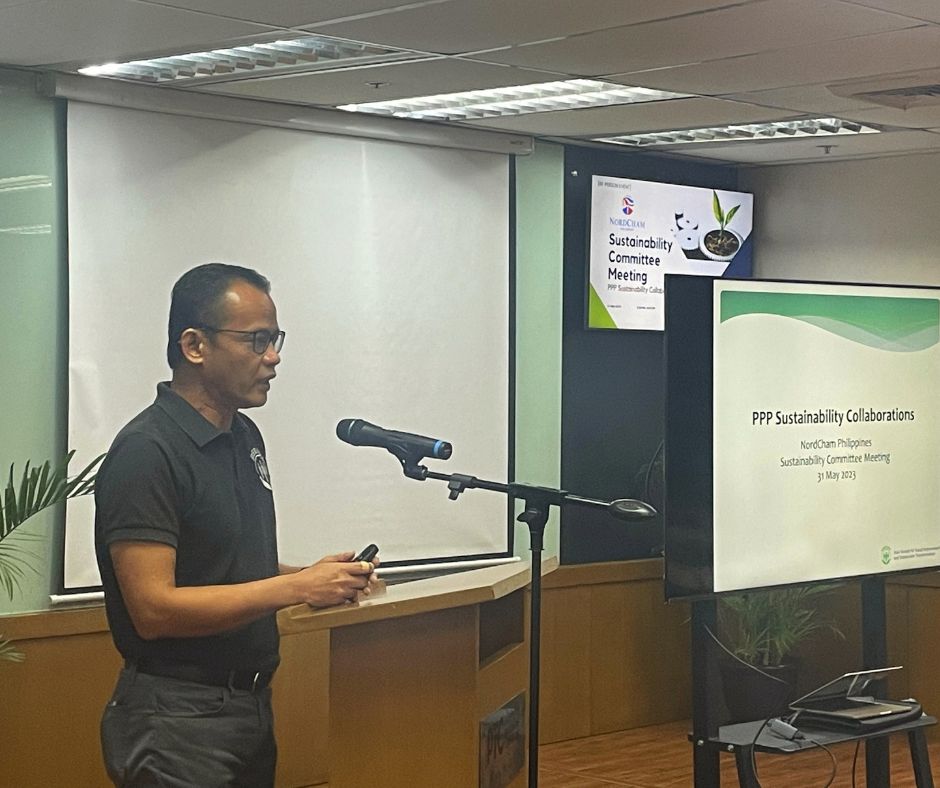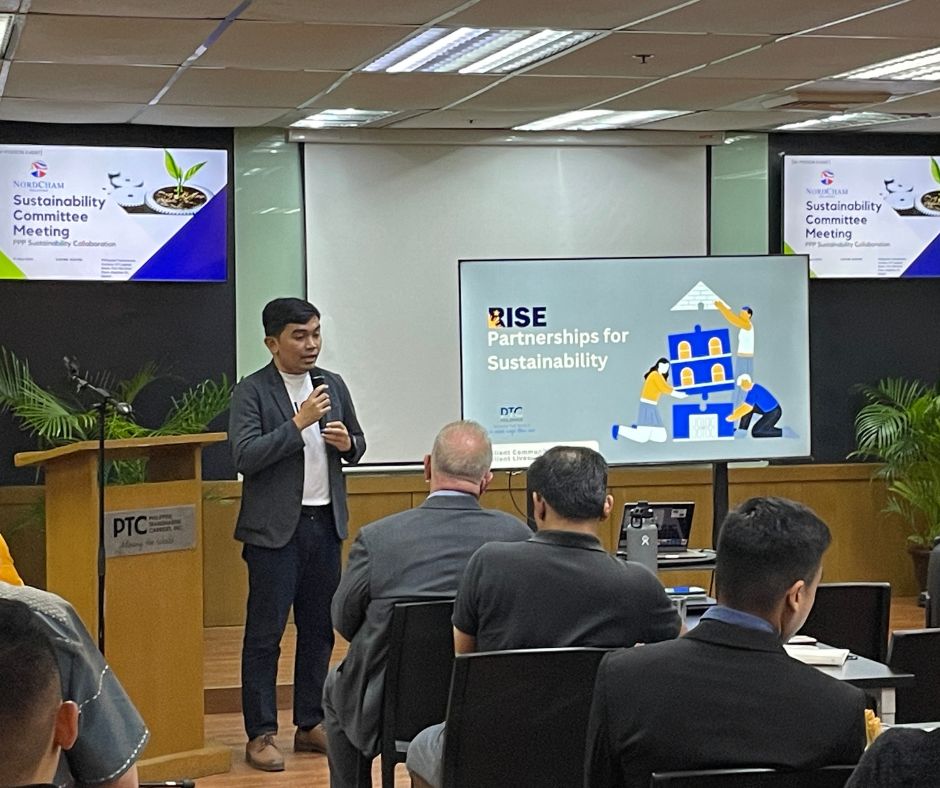"Empowering Partnerships: Understanding Challenges, Fostering Engagement for Impactful, Sustainable Programs", statement from NordCham Sustainability Committee
Successful partnerships highlight the importance of understanding community challenges, building relationships with local government leaders, and fostering active engagement and ownership among community members to create sustainable and impactful programs.
The Nordic Chamber of Commerce of the Philippines hosted its 12th Sustainability Committee Meeting focusing on the topic of PPP Sustainability Collaboration. It was held on the 31st of May 2023 at the Philippine Transmarine Carriers.
Representatives of various organizations attended the event, including, BDO Unibank, Inc., BJMO Mandaluyong City Jail, Green Heart Foundation, Greenlife, Haribon Foundation, John Clements Consultancy, Inc., KeystonePartners, Loadconsultants, Nomura Research Institute, Oxford Business Group, Philippine Coast Guard, Rural Bank of Silay City, and Tetra Pak Philippines.
Esteemed speakers were Mr. Francis Macatulad, Executive Director of Asia Society for Social Improvement and Sustainable Transformation (ASSIST) and Mr. Hector Brizuela, Project Lead of RISE at Philippine Transmarine Carriers – both business partners of NordCham – we are happy to make introductions if requested.
Mr. Francis Macatulad started the presentation by discussing the foundations of a Public-Private Partnership (PPP). It refers to an agreement between the government and private firms to finance, design, implement, operate, and maintain public sector services and infrastructure. He added the significance of PPP in driving infrastructure development and addressing social issues. He also highlighted how previous administrations effectively utilized PPP to implement large-scale infrastructure projects over the past few decades such as expressways, train systems, power plants, highways, bridges, and more.
Mr. Francis then presented the major advantage of PPP is its ability to address the limited availability of government funds by involving private capital, allowing the government to allocate resources to other important programs. The partnership also distributes project risks among multiple stakeholders, leading to efficient implementation and reduced costs compared to solely government-led initiatives. PPP also ensures transparency, accountability, and high-quality service delivery, while the private sector gains an opportunity to generate revenue.
Two main types of PPP were discussed:
Availability PPP, where private firms participate in providing a specific service or infrastructure, such as constructing school buildings, with the government retaining ownership.
Concession PPP, where the government grants long-term contracts to private firms for the construction, operation, and maintenance of infrastructure like highways, bridges, and power plants.
In both cases, projects are awarded to the best private company through a competitive bidding process.
Mr. Francis explained that PPP emphasizes sustainability through the ESG (Environment, Social, Governance) framework. Sustainability involves adhering to environmental policies, promoting social welfare, and ensuring sound organizational governance. He went on to explain the developmental sector benefits from PPP, such as improving social impact, contributing to economic development, and supporting relevant sectors like youth programs and healthcare initiatives.
He presented examples of successful PPP projects of ASSIST, to name a few:
SOLution is a project in partnership with Grundfos, a Danish premium water pump company, funded by the German government through the Foreign Ministry for Economic Cooperation and Development. Solar-powered irrigation pumps were installed to benefit agricultural cooperatives in Central Luzon, addressing environmental concerns and empowering farmers. The business impact of Grundfos was their technology was introduced to the Philippines. A package was then created so agriculturists and cooperatives could avail themselves of similar equipment from Grundfos.
Future Movers, a program for displaced youth in Marawi were identified and trained in construction and occupational hazards upskilling that will enable them to increase job competitiveness. This program was funded by the European Commission through their Enable and VETToolbox agencies.
Onion Union, a project partnering with East West Seed, funded by KFWDEG. Smallholder onion farmers were trained and capacitated to introduce modern agricultural practices, improve quality, and reduce production loss.
Cacao Pro in partnership with Yara Fertilizer, funded by KFWDEG, to address production constraints through training on Yara's crop nutrition solutions and efficient crop handling.
Empower is a project in partnership with Schneider Electric by distributing ongoing training for green electricians.
CoFFEE (Coffee Technologist and Funds to Fuel Economic Empowerment for a community in Mindanao) where ASSIST capacitated the coffee growers.
Mr. Francis concluded his presentation by enjoining the attendees for an opportunity to secure funding through grant proposals with the help of his team by conducting research, writing proposals, and guiding organizations through the application process to secure funds for their programs. By partnering with the ASSIST, organizations can expand their work and further contribute to social development.

Mr. Brizuela followed the presentation by introducing Project RISE, a sustainability initiative of PTC to improve resiliency and provide support and education for seafarer communities in the Philippines. He emphasized the importance of partnerships in implementing the program successfully. By partnering with organizations, they were able to develop training programs and engage community partners effectively.
The strategy behind RISE is to provide opportunities, make waves, and sustain growth. Project RISE builds the capacities of people and communities by ensuring that they can spread the knowledge gained from the program and sustain their involvement. This involves delivering programs and selecting influential champions within the communities who can train others. Making waves means these champions get to train others independently. Finally sustaining growth means that progress and training of these seafarer communities are monitored, while follow-up activities are conducted to ensure the sustainability of the engagement.
Mr. Brizuela also shared RISE's impact in numbers. Over two years, RISE has trained 10,371 individuals in six cities and municipalities (Bacoor and Imus in Cavite, Balayan in Batangas, Iloilo City, Cabuyao in Laguna, and Minalin in Pampanga), with 649 trainers responsible for training these individuals. The program has also partnered with 34 schools, colleges, and universities.
He stressed the importance of PPPs (Public Private Partnerships) and community engagement for meaningful impact. The support of the local government units (LGUs) is essential to the success and sustainability of community participation programs. The LGU (Local Government Units) serves as a gatekeeper in the community, ensuring the program's impact is maintained and supported. The shared resources and collaboration between the private sector and local government facilitate continuity and sustained participation.
Mr. Brizuela provided two examples of successful partnerships with LGUs:
Iloilo City demonstrated a strong commitment to disaster preparedness and had well-established programs in place. The RISE program aligned itself with these existing programs, which helped secure the support of the local government. The city had efficient institutions that welcomed partnerships, and they actively encouraged collaboration with diverse stakeholders. This endorsement and support from the local government boosted the credibility and impact of the RISE program. The volunteers were empowered to independently conduct learning sessions with support from the local government.
Minalin is a fourth-class municipality in Pampanga with a smaller population, making it an agile community where things can be implemented quickly. Since Minalin is located near the Pampanga River and is prone to flooding during storms and typhoons, the community members understood the value of disaster preparedness. This understanding, coupled with the endorsement from retired seafarers who were familiar with the maritime industry and its safety training, resulted in a meaningful impact on the low-income communities of Minalin. The program also introduced opportunities in the maritime industry to students at a local maritime Senior High School, further enriching their engagement and understanding of disaster resilience.
He also shared that the presence of champions within the community is crucial. These local champions advocate for the program, liaise with the community, and ensure the program's success and acceptance. Partnerships with local government leaders, including mayors, barangay captains, and councilors, are vital to gaining support and approval for the program.
The presentation concluded with the RISE team's key learnings from partnerships. Effective programs must address community challenges and actively listen to community partners. It is important for local champions to act as ambassadors as this can bridge the gap between the program and the communities. On the other hand, local government leaders become valuable allies when they understand and support the program's impact on their constituents.

Afterward, the attendees engaged in a facilitated brainstorming session. Below are the highlights from the discussion:
More investment in company immersion and team-building programs is necessary
It is important to invest in finding opportunities to work with local communities advocating for sustainable opportunities, development, and projects focus on disaster risk management
Benefits from the PPP are knowledge transfer, education, exposure
Advocating in communities and getting them to understand at a local level can be done by getting local champions
Ensure sustainability through the implementation of nature-based solutions
Foster LGU ownership and engagement in the project
Enhance public relations and innovate with the available resources
Identify and empower influential local champions who can drive significant impact.
The NordCham Sustainability Committee aims for more collaboration across industries and to learn from each other and experts. Since April 2022, the Sustainability Committee has hosted 12 meetings on varying sustainability topics with resource speakers and sharing of best practices, networking opportunities and partnerships, and collaboration with government units.
Moving forward, the Sustainability Committee Meeting will feature the winners from the recently concluded Nordic Sustainability Awards in each category. The next Sustainability Committee Meeting will be on the 21st of June 2023 from 3:30-6:00 PM. We are planning to showcase Nokia culture, H&S best practices, wellness 360, CSR projects, and NokiaEDu, for winning the Outstanding Employer of the Year. Registration details and location will follow.
